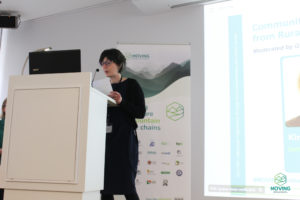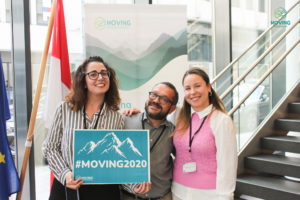
On June 13 and 14, the MOVING Final Conference: “A Future for Mountain Areas in Post-2027 EU Priorities” took place in Brussels, marking the culmination of a four-year journey for the project. This two-day high-level event gathered over 60 participants from European Institutions (European Parliament, European Commission, European Economic and a Social Committee, Joint Research Centre), EU support services (ESPON, Joint Research Centre, Rural Pact Support Office), EU stakeholder groups (Euromontana, AREPO), research community and local/regional mountain actors to underscore the crucial role of mountain areas in advancing Europe’s political objectives and targets by 2030.
Organised by the European Association for Innovation in Local Development (AEIDL) and hosted by AREPO within the framework of the EU-funded H2020 MOVING project (MOuntain Valorisation through INterconnectedness and Green Growth), the event was strategically timed to discuss the pivotal role of mountains and mountain value chains in achieving Europe’s political targets by 2030 and shaping the post-2027 EU political agenda.
Mar Delgado, MOVING Coordinator and Professor at the University of Cordoba, opened the event by asserting, “This is not the end of MOVING, but the start of a better future for EU policies for mountain areas post-2027.” This sentiment was echoed by key speakers who stressed the importance of ongoing support for mountain regions.
Mario Milouchev, Director at Directorate D “CAP Strategic Plans II”, at DG AGRI of the European Commission, further highlighted the pivotal role of EU policies in supporting rural and mountain regions. Milouchev presented the achievements and upcoming steps of the stocktaking of the Long-Term Vision for Rural Areas (LTVRA), noting, “This conference on mountain areas is a useful contribution to the ongoing debate on future EU policies post-2027”.

The conference featured presentations from MOVING partners to showcase the challenges and opportunities within mountain value chains. Multiple strategies to upgrade these value chains were discussed during the second session of the conference, moderated by Giulia Scaglioni, Policy officer of AREPO, alongside the Repertoire of Strategic Options.
Several roundtables with experts, including Wiktor Szydarowski, Director at ESPON EGTC, Eleftherios Stavropoulos from the Joint Research Centre, Klavdija Ramsak-Noemi from DG AGRI, Benoit Nadler from DG REGIO, and Toma Šutić, Member of the Cabinet of Vice President charged with Democracy and Demography from the European Commission, focused on the effectiveness of solutions, tools and policies necessary to support mountainous regions. They highlighted the critical importance of integrating rural and mountain regions into EU policies through innovative tools, expert-driven solutions, and strengthened cohesion efforts to ensure these areas contribute to and benefit from Europe’s broader social, economic, and environmental goals.
The second day of the conference focused on MOVING’s policy recommendations for unlocking the power of mountain value chains, with an emphasis on the post-2027 programming period.
Mark Redman, Director of Highclere Consulting, unveiled the MOVING Policy Roadmap, built on eight needs-driven building blocks: implementing better governance and regulation, fostering collaboration and networking, growing skills, knowledge, and innovation, ensuring mountain livelihoods, promoting mountain product quality, sustaining the use of local assets, and preparing and adapting for change.
Key speakers such as Gustavo Lopez Cutillas from the REGI Committee Secretariat of the European Parliament, Guillaume Corradino, Director of Euromontana, Erik Gløersen from Spatial Foresight, and Urszula Budzich Tabor from the Rural Pact Support Office emphasised that the roadmap provides a timely, detailed, and strategic framework for enhancing mountain value chains. They highlighted the importance of evidence-based, place-based policies and fostering collaboration, which are crucial for future EU policy development and practical implementation.

The conference concluded with Mar Delgado thanking all attendees and extending her gratitude to partners for their hard work over the past four years towards a better future for mountain areas. The event underscored the vital role mountain areas play in achieving Europe’s broader political and environmental goals by 2030.
About the MOVING Project: The MOVING project is an EU-funded H2020 project focused on building capacities and co-developing policy frameworks to establish new or upscaled value chains, contributing to the resilience and sustainability of mountainous areas in Europe.

MOVING is funded by the European Union’s Horizon 2020 R&I programme. The contents of this article do not reflect the official opinion of the European Union. The responsibility for the information and opinions expressed in it lies entirely with the author(s).










